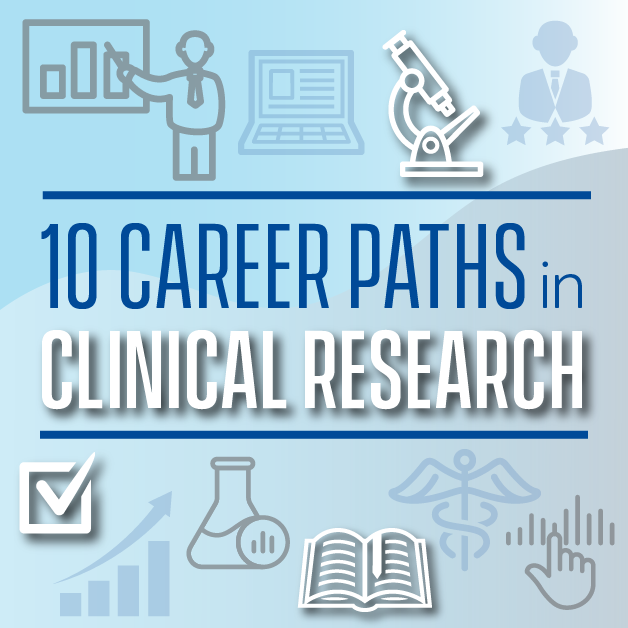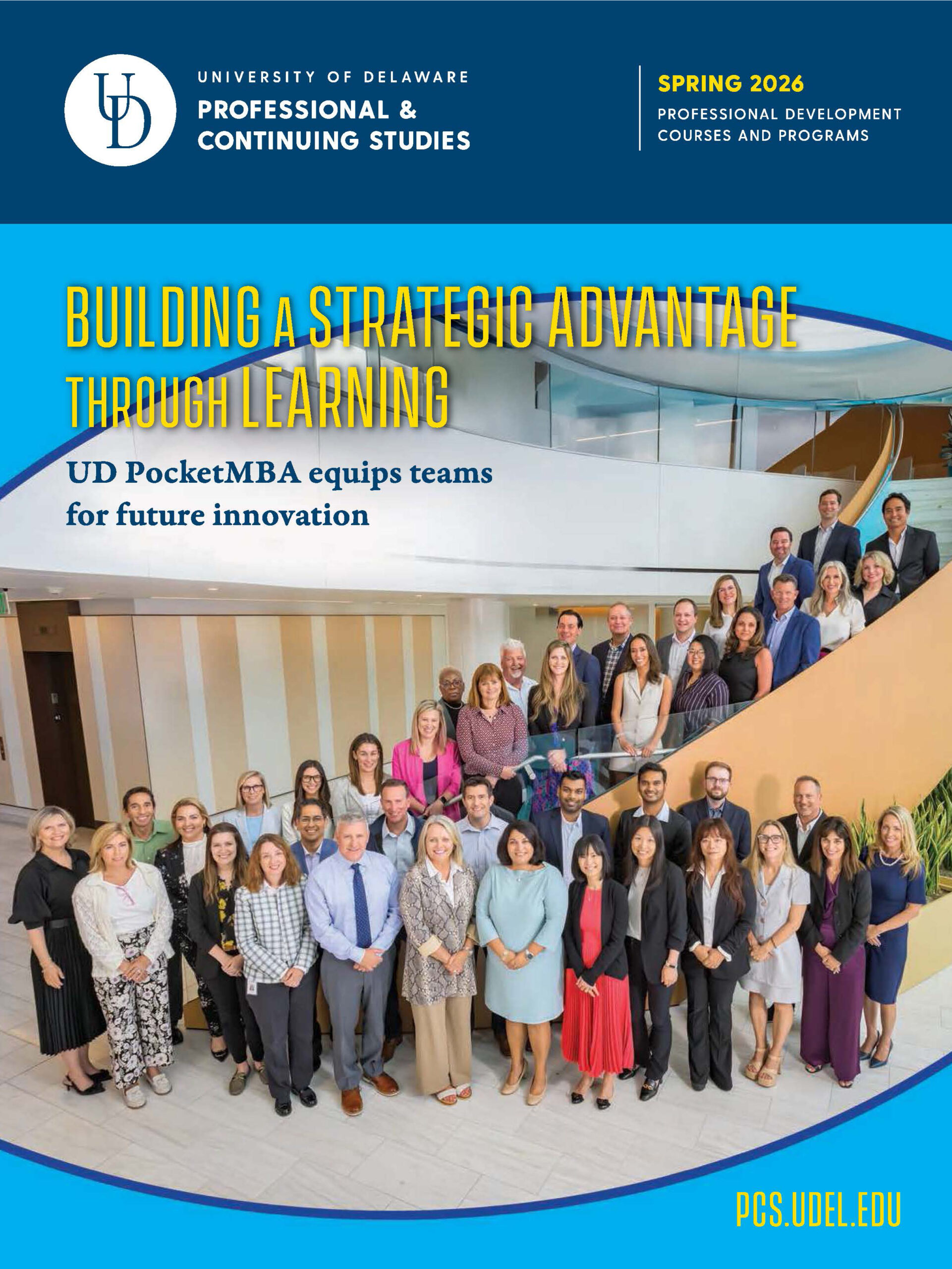 Prepare for diverse opportunities in the clinical research field
Prepare for diverse opportunities in the clinical research field
Online | Self-Paced | 14 Weeks | Badge-Eligible | ACRP Certification Preparation
Next program starts February 9

- Enter the clinical research field, advance in your job or build useful new skills
- 14-week online course — February 9 – May 15, 2026
- Financial assistance options — Payment plan, scholarships, discounts, click here for details.
- Career resources and support to help you succeed
- LEARN MORE — View recorded info presentation with the instructor

This comprehensive Clinical Trial Management course prepares learners to confidently manage and support clinical trials across their full lifecycle. Grounded in industry standards and aligned with ACRP competencies, the course blends foundational knowledge with practical, real-world application — ideal for professionals entering the field or advancing their clinical research careers.
Learners engage with pre-recorded lectures, short videos, curated articles, interactive modules and applied case studies, allowing flexibility while reinforcing practical skills used in today’s clinical research environment.
The Clinical Trials Management Online Certificate is offered 100% online and provides a broad overview of key competencies necessary for a successful understanding and conduct of the new product development process in today’s environment. Course topics include:
- Clinical trials process, roles and responsibilities
- U.S. regulatory compliance
- Ethical and safety considerations
- Data management and coding principles
- Monitoring and oversight of clinical trials
- New product introduction, branding and marketing

About the clinical research and product development field
The field of clinical research focuses on developing cost-effective ways to treat disease and improve quality of life through the successful development and launch of new biologics, medical devices and pharmaceuticals, as well as by incorporating advancements in genomics and personalized prescribing. New product development requires broad collaboration among science and technology professionals who stay current in medical, scientific and regulatory practices.
Opportunities in the field are extensive and diverse, ranging from principal investigator roles to supportive functions involving regulatory compliance, scientific writing, marketing, data management and other essential activities. Professionals conducting clinical trials often come from health care backgrounds and work across a wide range of employment settings, including pharmaceutical, biotechnology and medical device companies; contract research organizations; hospitals; educational institutions; and independent consulting practices.
Clinical research teams collaborate across multiple business units, beginning with the sponsor of an investigational product; continuing to the clinical sites that collect ongoing data from participants; and extending to the sponsor or designee responsible for monitoring data quality and ensuring regulatory compliance. Each step relies on accurate, reliable data to support submission to regulatory agencies and to advance new therapies into practice.
Click here for more information about career opportunities in the field.
PROGRAM DETAILS
- Registration and schedule
- Who should enroll in this program
- Learner outcomes
- Career resources to help you succeed
- Detailed program outline
- Instructor — Erika Jerome, MA, MS ACRP-CP
- Prerequisites
- What our students say
- For more information / Contact us
Registration and schedule
![]() Clinical Trials Management Certificate — noncredit online certificate program
Clinical Trials Management Certificate — noncredit online certificate program
- LOCATION: ONLINE — This is a self-paced online course with some scheduled requirements.
- SCHEDULE: February 9 – May 15, 2026
- PRICE: $2,350
- Super Early Bird discounted price, $1,650 — Enroll by Dec. 15, 4:30 p.m. Register with code SUPEREB.
- Early Bird discounted price, $1,800 — Enroll by Jan. 20, 4:30 p.m. Register with code EBIRD.
- Penalty-free refund through Jan. 20, 4:30 p.m. — click here for details
- PAYMENT PLANS: A payment plan is available, allowing for an estimated 40% down payment at the time of registration, and 3 remaining payments, approximately monthly, according to the payment plan schedule. Click here for details.
- REGISTRATION DEADLINE: Registration closes Feb. 4, 4:30 p.m.
- FINANCIAL ASSISTANCE & SCHOLARSHIPS: Click here for details about financial assistance and scholarship options.
- CEUs: 2.0 (20 contact hours)
Who should enroll in this program?

- Individuals new to clinical research seeking a structured, credible entry point
- Mid-career professionals looking to formalize experience or prepare for ACRP certification
- Health care, life sciences and research professionals seeking career advancement
Clinical trials professionals are employed in a variety of settings:
- Pharmaceutical companies
- Biotechnology organizations
- Medical device companies
- Contract research organizations
- Hospitals
- Educational institutions
- Independent contractors
A clinical research professional may serve in the following roles:
- clinical investigator
- sub-investigator
- clinical researcher
- research nurse
- administrator
- coordinator
- data manager
- project manager
- IRB coordinator
- quality assurance specialist
- regulatory affairs specialist
- research pharmacist
- consultant
- educator in clinical trials management
Learner Outcomes
By the end of this course, students will be able to:
- Understand the ethical, regulatory and operational foundations of clinical trials.
- Apply best practices in trial planning, site management and investigational product handling.
- Navigate key compliance requirements, monitoring standards and safety reporting processes.
- Explain how clinical trials connect to medical communication, product marketing and career development opportunities.
- Prepare for the ACRP certification exam and earn a digital badge to demonstrate professional skills.
Career resources to help you succeed
NEW! — Participants enrolled in this certificate program will have access to a new suite of career resources and services to help them navigate a career transition, maximize their job search efforts and more. Click here to learn more about UD PCS Career Services.
Detailed program outline
To earn the Clinical Trials Management Certificate, all four of the following modules must be successfully completed with a passing grade (60 or higher) and earn an overall final grade for the certificate of 70 or above.
The curriculum of the Clinical Trials Management Online Certificate covers core concepts consistent with the Association of Clinical Research Professionals (ACRP) certification exams, a valuable credentialing opportunity for clinical research professionals. For exam details, including eligibility requirements, visit Association of Clinical Research Professionals.
Course format — This online course can be completed on a self-paced basis within the 14-week course timeframe. All quizzes/assessments are due by the last day of class. Optional synchronous component: three scheduled live-online chats.
Required textbook (not included in price): A Practical Guide to Managing Clinical Trials, 1st Edition
Module 1: Clinical research foundations (Basics)
Build a strong foundation in how clinical trials are designed, regulated and ethically conducted.
- Ethical considerations in clinical research
Explore core ethical principles, informed consent, participant protection and oversight bodies through short videos and case-based modules. - Roles, phases of clinical research and the New Drug Application (NDA)
Learn who does what in a clinical trial and how studies progress from early phases to regulatory submission, supported by visual timelines and explainer videos. - Trial design, key considerations and FDA approval
Understand common trial designs, endpoints and regulatory decision-making through interactive scenarios and applied examples.
Module 2: Trial operations and processes (Process)
Learn how clinical trials are planned, executed and supported on a day-to-day basis.
- Regulatory and trial management
Gain insight into essential documentation, regulatory submissions and operational oversight using guided learning modules and readings. - Site management
Learn about site selection, activation and ongoing management, with practical tips for working with research sites.
- Manufacturing, packaging, labeling and coding of investigational product
Learn how investigational products are prepared and controlled, using short videos and real-world examples. - Supplying and handling investigational product
Explore supply chain management, storage requirements and accountability through scenario-based learning.
Module 3: Compliance, oversight and risk management (Compliance)
Develop the skills needed to ensure trials remain compliant, high-quality and inspection-ready.
- Sponsor – site communications and visits
Learn best practices for effective communication, site visits and issue resolution through role-based examples. - Monitoring and auditing (Pre-recorded lecture)
Understand monitoring strategies, audit readiness and inspection expectations from the instructor’s perspective. - Budgets, contracts and legal issues
Gain exposure to financial and contractual considerations that impact trial success. - Implementation: additional topics
Address real-world operational challenges that arise during trial execution. - Data Management
Learn how clinical data are collected, validated and managed to support regulatory compliance and analysis. - Safety Considerations and Reporting
Understand adverse event reporting, pharmacovigilance principles and participant safety oversight through practical examples.
Module 4: From trial to market and career pathways (Integration)
See how clinical trials connect to broader health care, business and professional opportunities.
- Medical communications
Learn how trial results are communicated to stakeholders, regulators and the medical community. - Marketing a product
Explore how clinical data support product positioning, approval and lifecycle management. - Careers in clinical research
Discover diverse career paths in clinical research and trial management, with guidance on professional development and certification preparation.
Instructor — Erika Jerome, MA, MS ACRP-CP
Erika Jerome is a certified and experienced manager of the Investigator-Sponsored Research Unit (ISRU) at Fox Chase Cancer Center, a leading academic institution in oncology research and care. She has been working in research for over 10 years, with a focus on clinical trial management, compliance and regulatory. In her current role, she oversees and manages the protocol development and monitoring team within the ISRU, ensuring the timely activation, sufficient monitoring and regulatory compliance of all investigator-sponsored trials at FCCC. She also maintains cross-functional collaborations with clinical team leads, physicians and upper management, while providing consultation and support to her direct reports. She is passionate about advancing science and facilitating the development and dissemination of novel and effective therapies.
Prerequisites
It is expected that students pursuing the Clinical Trials Management Certificate will have a strong science and/or health-care related background. In addition, two years of college level coursework is recommended. The certificate provides the fundamental knowledge to enter the field of clinical research.
Technology requirements
REQUIRED: laptop or desktop computer
- Required: a PC or Mac, laptop or desktop computer must be used to complete course activities like tests, quizzes, homework, or chats
- Required: high-speed Internet access
- Required: any major web browser
- Required: if not already installed on your computer, you may need to install these free plugins: Flash | Adobe Reader
OPTIONAL: mobile device
- Optional: most course video content can be viewed on a mobile device like a tablet, iPad or smart phone
- Mobile devices cannot be used to complete required course components like homework, tests, quizzes, chats
What our students say
- “I feel passionate about the clinical trial path, and I believe the knowledge I’m gaining will further my goal of pursuing opportunities to enter this field.”
- “[This course] was relevant to my current position as a CRA [clinical research associate]. Every module had a reference back to my daily position. This has been very useful.”
- “This is a great program and I would recommend it to all my co-workers at work for a better understanding of Clinical Trials.”
- “It was a great experience, I never felt as though I was falling behind and if I were to have any questions I knew I had the support I needed.”
- “The course was very informative, and the instructor provided additional supporting background when necessary.”
For more information


